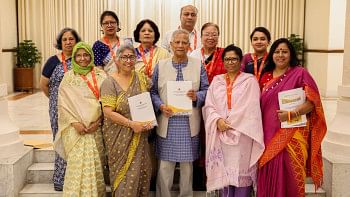Residents struggle amid salinity surge

Residents in various areas of the port city of Chattogram are grappling with an acute water crisis as supplies from the Chattogram Water and Sewerage Authority (CWasa) have significantly diminished.
CWasa is compelled to shut down its treatment plants daily for extended periods due to saltwater intrusion in the Halda river and reduced water release from Kaptai Lake. As of November last year, the state agency had a total of 98,755 registered consumers.
"We are only getting water once or twice a week. Due to the shortage, we are forced to buy bottled water from the local market," said Abdullah Al Noman, a resident of the Akbar Shah area.
Tofayel Ahmed, a resident of the Bahaddarhat area, said, "With our limited income, we are compelled to buy bottled water for consumption. This is putting extra financial strain on us."
CWasa operates four surface water treatment plants -- two in Rangunia on the bank of the Karnaphuli River and two in Madunaghat and Mohora areas along the Halda River -- with a combined production capacity of around 46 crore litres of water daily. However, the ongoing crisis has seen daily production reduced to around 40-41 crore litres.
According to CWasa's data, salinity levels in the Halda have spiked significantly above the usual range of 100-250 mg per litre near the Mohora plant.
The salinity levels recorded most recently were 2,300 mg per litre on March 2, followed by 2,280 mg per litre on March 3, and 1,520 mg per litre on March 4.
Higher salinity levels were also noted at the Madunaghat plant area -- 1,700 mg per litre on March 2, followed by 1,500 mg per litre on March 3, and 1,020 mg per litre on March 4.
"Halda's increasing salinity has forced the closure of the two plants for two to three hours daily, leading to reduced water production by at least 3-4 crore litres," said Maksud Alam, chief engineer of CWasa.
"Meanwhile, the water release from Kaptai Lake into the Karnaphuli has reduced significantly as the lake's water level has dropped following prolonged periods of low rainfall. Consequently, the water level of the Karnaphuli River has also fallen, reducing water production at the two plants in Rangunia by around 2 crore litres daily," he added.
The Consumers Association of Bangladesh has expressed concern over the high salinity levels in CWasa's water in a statement yesterday. "Due to the negligence of certain CWasa officials, city residents are being forced to endure water shortages and are even having to drink salty water, especially during the Ramadan," the statement read. The CWasa chief engineer said, "We maintain salinity levels in the water at a maximum of 250 mg per litre. While some salinity may remain after the purification process, it does not exceed the 250 mg per litre limit."

 For all latest news, follow The Daily Star's Google News channel.
For all latest news, follow The Daily Star's Google News channel. 



Comments